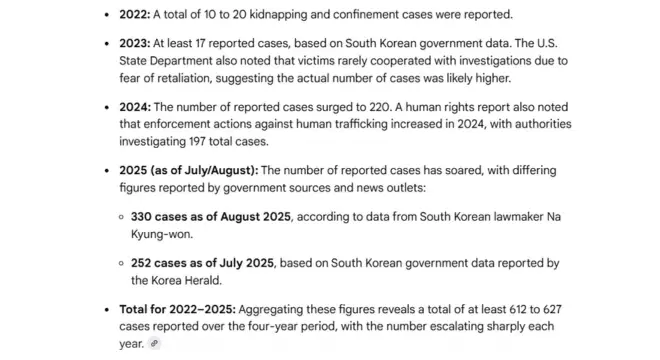|
Getting your Trinity Audio player ready...
|
Have you ever imagined that a simple summer vacation could turn into a nightmare?
How could a 22-year-old Korean college student, known only by his surname “A,” be kidnapped and tortured while abroad?
Is this just a tragic one-off, or is it part of a bigger, more alarming trend?
And how safe is Cambodia really for Korean travelers today?
A recent report indicated a steep rise in the number of Koreans abducted and imprisoned in Cambodia, with the number of cases reaching into the hundreds in 2025. This shocking escalation indicates the increasing presence of organized crime and work scams occurring in the region and that innocent travelers are at serious risk.
In this article, we will discuss this specific tragic incident and examine the larger issue of the safety of Koreans in Cambodia — let’s take a closer look.
Main Story: The Student’s Case
On July 17, a 22-year-old South Korean college student, referred to only by his surname “A”, left his home in Yecheon, North Gyeongsang Province, stating to their family that he would travel to Cambodia to participate in an exhibition for his summer vacation.
Around one week later, about July 24, their family received a shocking phone call from a man who spoke with a Chinese-Korean accent, who demanded 50 million won ($35,000), to release the student, “A“.
The family immediately contacted the Cambodian Embassy and local authorities, yet, despite continued efforts, the kidnappers disappeared, four days later, leaving the family with anxiety and despair.
Sadly, on August 8, the student, “A” was discovered dead near Bokor Mountain, Kampot Province, where he originally disappeared. If Cambodian authorities determined the cause of death was due to cardiac arrest from torture and excruciating pain.
Speaking about their loss, the student’s family shared:
“His death certificate says he died of cardiac arrest caused by torture. He’s still in a freezer in Cambodia — it feels like he’s being killed twice.”
This heartbreaking case highlights not only the personal tragedy of one family but also the increasing risks faced by Korean nationals in Cambodia.
Rising Kidnapping Crisis in Cambodia
The tragic case of the Korean student is not an isolated incident. Over the past few years, Cambodia has seen a dramatic surge in kidnappings targeting Korean nationals.
According to government data and local media reports, the numbers paint a worrying picture:
| Year | Reported Cases of Korean Kidnapping/Detention | Source |
| 2022–2023 | 10–20 cases per year | MOFA / News.Az |
| 2024 | 220–221 cases | Korea Economic Daily |
| 2025 (as of July) | 252 cases | Korea Herald / Nation Thailand |
| 2025 (as of August) | 330 cases | News.Az citing lawmaker Na Kyung-won |

This exponential growth highlights Cambodia as a major danger zone for Korean travelers, particularly those who might fall prey to fraudulent job offers or organized criminal networks.
The sharp rise in these cases has prompted the South Korean government to issue urgent travel warnings, urging citizens to exercise extreme caution when visiting certain areas of Cambodia.
The Scam Network Behind It
A larger number of Koreans traveling to Cambodia have become victims of complex scams that lure them with high-paying overseas jobs advertised as “tech jobs” or other enticing roles.
After they arrive, they are kidnapped by Chinese-speaking gangs, which often are associated with Triads and at times allegedly aided by local Cambodian authorities.
Victims then work in illegal call centers or cybercrime compounds, often in very dangerous situations. Those who resist will be beaten, shocked with electric shocks, and tortured in other ways, leaving many with scars both physical and mental.
One woman in her 20s, recently rescued, told MBC News about her harrowing experience:
“At least 13 more Koreans are still locked in the same buildings. They are treated like slaves — identified only by numbers.”
These accounts reveal a disturbing system where victims are dehumanized and trapped, highlighting the organized and dangerous nature of these criminal networks in Cambodia.

The Role of Cambodian Crime Compounds
A large number of what a casual observer may perceive as legitimate businesses are, in fact, cybercrime operations controlled by Chinese criminal organizations in Cambodia. These complexes are at the heart of a growing web of abductions, forced labor, and online scams.
The organization Amnesty International reports that over 50 of these complicated scam operations exist simultaneously in Cambodia. Many of these scams operate outside the jurisdiction of local authorities, which makes victim rescue significantly more difficult.
Unfortunately, the threat to life is real, and extremely serious. A Korean man, only identified by his last name Park, was found dead in a Cham scam complex in Kampot Province. Reports indicate evidence of assault and torture leading authorities to believe Park was being held in forced labor prior to his demise.
These complexes demonstrate a systemic and organized network of crime in Cambodia in which innocent foreign nationals are victimized, exploited, abused, and held captive in life-threatening circumstances.
Government Reactions & Diplomatic Moves
In response to the alarming rise in kidnappings and cybercrime targeting Koreans in Cambodia, South Korea’s Foreign Minister Cho Hyun summoned Cambodia’s ambassador to Seoul on October 10 to express “grave concern” over the ongoing crimes.
Minister Cho urged “swift and concrete action to eliminate online scams and prevent further loss of life,” emphasizing the urgency of protecting Korean nationals abroad.
In addition to diplomatic pressure, the South Korean government has issued travel warnings to alert citizens of the risks in Cambodia:
- Phnom Penh → Level 2 (Reconsider Travel)
- Sihanoukville, Bokor Mountain, Bavet → Level 2.5 (High-Risk Advisory)
Currently, only one Korean police officer is stationed at the embassy in Phnom Penh, which limits the government’s ability to respond directly to emergencies or conduct rescue operations.
These measures highlight the seriousness with which Seoul is treating the situation, while also acknowledging the challenges of protecting citizens in areas where criminal networks operate with near impunity.
The Bigger Picture: Human Trafficking & Cross-Border Crime
The harrowing incidents of Korean citizens in Cambodia are part of a wider and worsening crime problem in the country. Cambodia investigated a total of 197 human trafficking cases in 2024, an increase over the 164 cases investigated in 2023, according to the Business & Human Rights Resource Centre, reflecting a significant year-on-year increase.
That year, more than 2,600 Chinese nationals were removed from Cambodia for scams and human trafficking, which also indicates the cross-border nature of these crimes. The Minister of the Interior, Sar Sokha, has stated that Cambodia faces a grave threat from cross-border organized crime networks, and that technology-based scams pose a danger to both Cambodian citizens and foreigners who might be lured into forced labor or exploitation.
In this larger context, the kidnapping of a Korean national is not a unique event that occurred in a vacuum, but rather an example of a systematic, sophisticated and unpunished criminal network operating across Cambodia.
Conclusion: A Wake-Up Call
The young Korean student who tragically lost his life has sparked public anger and sorrow across Korea. This incident unveils a world of horrors, exploitation, and human trafficking with foreign organized crime networks operating with impunity in Cambodia.
What experts are saying is that until the governments of Seoul and Phnom Penh collaborate closely to investigate, and there is a quick response from authorities, the innocent lives of others may still be at stake as a consequence of organized crime.
As one official noted,
“The tragedy in Cambodia isn’t just one family’s nightmare — it’s a warning about a growing global crime network.”
This heartbreaking incident serves as a stark reminder of the urgent need for stronger safeguards, awareness, and preventive measures for travelers and expatriates in high-risk regions.Stay aware, stay safe — because even a dream trip can turn into a nightmare.


